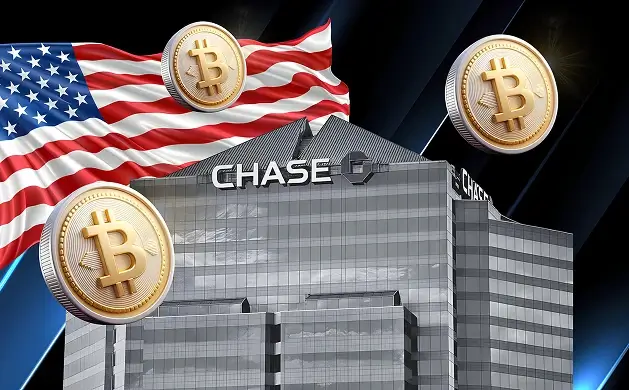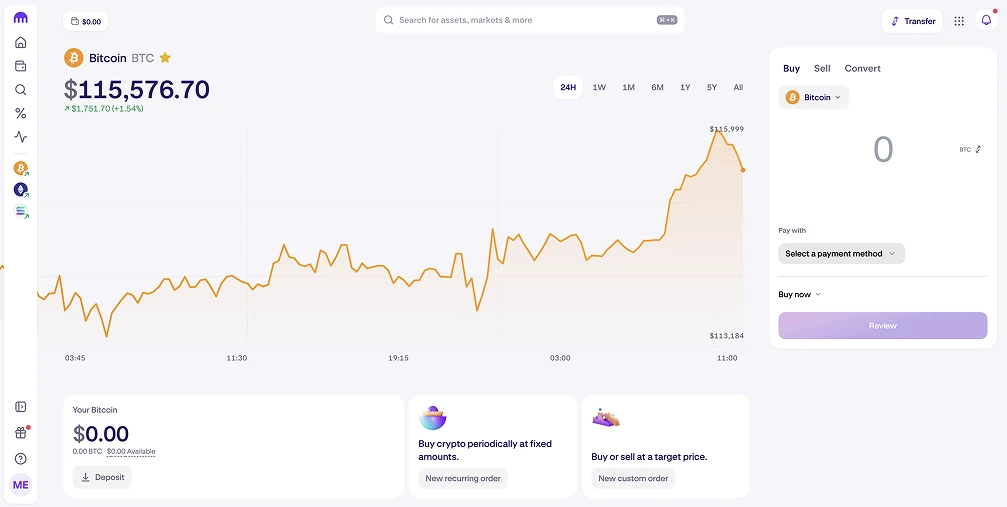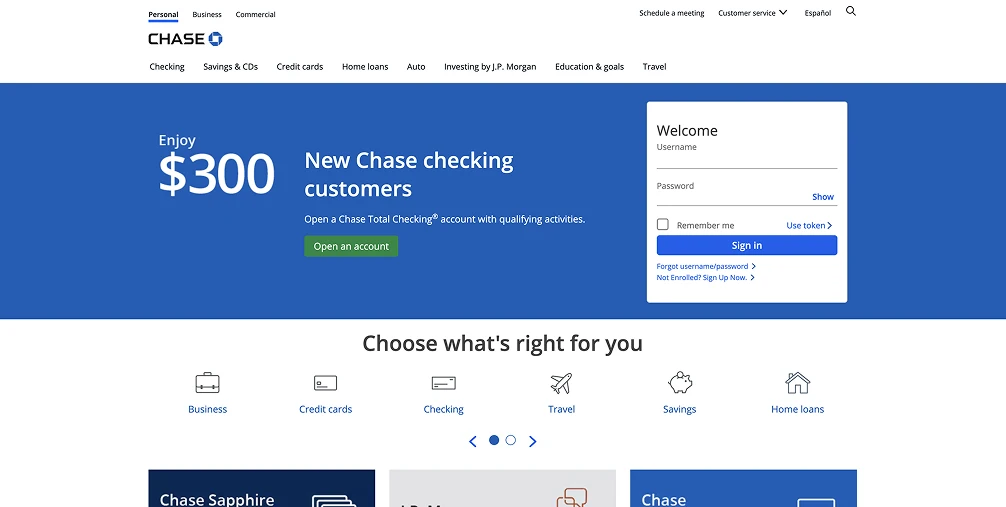How to Buy Bitcoin & Crypto with Chase Bank

Summary: Chase customers cannot buy cryptocurrency directly through the bank, but they can transfer U.S. dollars to regulated exchanges like Kraken, Binance.US, or Gemini.
Funding options include ACH, wire, debit card, and PayPal, with settlement times ranging from instant to a few days. Credit cards are not accepted, and some transfers may face limits or security holds.
Kraken is the best choice for Chase Bank customers as it combines free USD deposits, low trading fees, and U.S. regulatory oversight with access to staking and futures trading.
Licenses
Registered with FinCEN (MSB No. 31000270997766)
Available Assets
450+ Cryptocurrencies
Deposit Methods
ACH Transfer, FedWire, Credit Card and Debit Card
Can I Buy Bitcoin with Chase Bank?
Chase does not offer direct cryptocurrency trading through its online banking or Chase Mobile app. However, customers can still buy Bitcoin by transferring U.S. Dollars (USD) from their Chase account to a regulated crypto exchange in the United States.
Deposits are typically made using ACH transfers, domestic wire transfers, or Chase debit cards for faster funding. Once the funds clear, users can purchase Bitcoin and other digital assets on the exchange.
How to Buy Crypto with Chase Bank
Chase customers can buy cryptocurrency by funding accounts on regulated U.S. exchanges such as Kraken, which is registered with FinCEN as a Money Services Business (Registration Number 31000270997766).
Kraken accepts deposits from Chase accounts through ACH transfers, FedWire, debit cards, and PayPal. The platform lists over 450 cryptocurrencies, provides advanced trading tools, staking, and operates under U.S. regulatory oversight.
Step-by-step guide to purchasing crypto on Kraken with your Chase account:
- Open a Kraken Account: Go to Kraken’s official website, register, and complete Know Your Customer (KYC) verification.
- Deposit Funds: In your Kraken dashboard, select “Funding,” choose USD, and transfer money from your Chase account using ACH, wire, debit card, or PayPal.
- Select a Cryptocurrency: Browse Kraken’s markets, including Bitcoin, Ethereum, and hundreds of altcoins.
- Place Your Trade: Enter the USD amount, confirm order details, and complete the purchase. Funds will appear in your Kraken wallet once processed.

Fees for Chase Bank Customers Buying Digital Assets
Understanding deposit, withdrawal, and trading costs is essential before funding an exchange account. Below is a summary of Kraken’s current fee structure:
- Deposits: ACH, FedWire, CBIT, and SWIFT transfers are free. Debit or credit card deposits carry a 3.75% fee.
- Withdrawals: ACH and CBIT withdrawals are free. FedWire charges $4 to $30 depending on the banking partner (Dart Bank, Etana, or Customers Bank). SWIFT withdrawals range from $13 to $35.
- Trading: Spot maker fees range from 0.25% down to 0%, while taker fees range from 0.40% to 0.10%. Futures trades are priced at 0.02% (maker) and 0.05% (taker).
Kraken’s structure is cost-effective compared to Coinbase, where trading fees often exceed 2% and free USD deposits are not available.
Chase Bank Cryptocurrency Policy
Chase is considered one of the more crypto-friendly banks in the United States. It does not prohibit transfers to cryptocurrency platforms, and customers can freely send U.S. dollars from their Chase accounts to FinCEN-registered exchanges such as Kraken, Coinbase, or Gemini.
Most deposits are processed without issues, though transfers may be delayed if flagged for fraud or security checks. Debit card payments are supported on many exchanges, while Chase credit cards remain restricted for crypto purchases.
Although Chase does not offer direct spot crypto trading, its parent company J.P. Morgan provides indirect exposure through the Self-Directed Investing platform. Accessible in the Chase Mobile app and on chase.com, this service lets investors buy ETFs such as the iShares Bitcoin Trust (IBIT), the iShares Ethereum Trust (ETHA), along with other blockchain-focused funds.
Best Alternative Crypto Exchanges for Chase Customers
Chase customers seeking alternatives to Kraken can choose from several FinCEN-registered cryptocurrency exchanges in the United States:
- Binance.US: Registered with FinCEN under BAM Trading Services Inc. (NMLS ID #1906829). Accepts USD deposits from Chase via ACH, wire transfers, debit, and credit cards. Supports 160+ cryptocurrencies, fees from 0.1%, OTC services for large trades, and staking on 20+ assets.
- Coinbase: Registered with FinCEN and licensed as a Money Transmitter across multiple states. Accepts USD deposits through ACH, wire transfers, and debit cards. Lists 200+ cryptocurrencies, fees from 1.49%, and provides a self-custody wallet.
- Gemini: Licensed as a New York trust company and registered with FinCEN. Accepts Chase deposits via ACH, wire transfers, and debit cards. Supports 70+ coins, fees from 0.2%, secure custody standards, and the Gemini Credit Card with crypto rewards.
When selecting an exchange, consider deposit methods, fees, asset variety, and security.

About Chase Bank
Chase Bank, officially JPMorgan Chase Bank, N.A., is the largest consumer bank in the United States, serving over 80 million customers. It is the retail and commercial banking division of JPMorgan Chase & Co. and provides checking and savings accounts, credit cards, mortgages, auto loans, small business services, and investment products.
Through the Chase Mobile® app and chase.com, customers manage payments, budgeting, and investing, making Chase one of the most comprehensive banking platforms in the country.

Final Thoughts
Chase customers looking to invest in crypto can move funds to regulated U.S. exchanges like Kraken, Coinbase, or Gemini through ACH or wire transfers.
For those who prefer exposure without managing digital assets directly, J.P. Morgan’s platform also offers ETFs tied to Bitcoin, Ethereum, and blockchain.
The key decision is whether you want hands-on ownership through an exchange or regulated ETF access within your Chase investing account.
Frequently asked questions
Are there limits when transferring funds from Chase Bank to crypto platforms?
Yes. Limits depend on the transfer method and your account type. For most U.S. Chase personal accounts:
- ACH transfers: Typically capped at around $25,000 per day, with some per-transaction limits closer to $10,000.
- Debit card deposits: Lower limits that vary by exchange, often imposed for fraud prevention. These are usually shown at the time of deposit.
- Wire transfers: Generally allow the highest amounts, often exceeding ACH caps, but carry higher fees. The default limit is $100,000 and you will need to call the bank to increase this.
Chase may adjust these limits based on your account history, verification status, and risk profile. When initiating a transfer, Chase or the exchange will display the maximum amount allowed.
What are the best deposit methods for Chase Bank customers funding crypto exchanges?
The fastest methods are debit card payments and PayPal, which typically clear instantly but may have lower limits. ACH transfers are cost-effective but take 1–3 business days, while FedWire and SWIFT wires settle the same day for larger transfers, though fees may apply.
Does Chase Bank allow international wire transfers to crypto exchanges?
Yes, Chase supports international wires to regulated exchanges that accept SWIFT payments. Customers should confirm the exchange’s banking partner details and note that fees and settlement times vary by destination.
Can Chase credit cards be used to buy cryptocurrency?
No, Chase credit cards cannot be used for direct crypto purchases. Customers must rely on debit cards, ACH transfers, or bank wires to fund exchange accounts.

Written by
Antony Bianco
Head of Research
Antony Bianco, co-founder of Datawallet, is a DeFi expert and active member of the Ethereum community who assist in zero-knowledge proof research for layer 2's. With a Master’s in Computer Science, he has made significant contributions to the crypto ecosystem, working with various DAOs on-chain.

.webp)


.webp)





